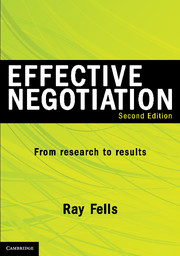Book contents
- Frontmatter
- Contents
- Preface
- Acknowledgements
- 1 Why isn't negotiation straightforward?
- 2 The DNA of negotiation
- 3 The knight's move
- 4 Phases and phrases
- 5 A negotiation script and other ways to manage a negotiation
- 6 Digging deep to deal with differences
- 7 Light bulb moments: exploring for options
- 8 A final balancing act: the end-game exchange
- 9 Building bridges
- 10 Cross-cultural negotiations: much the same but different
- 11 Becoming an effective negotiator
- References
- Index
9 - Building bridges
- Frontmatter
- Contents
- Preface
- Acknowledgements
- 1 Why isn't negotiation straightforward?
- 2 The DNA of negotiation
- 3 The knight's move
- 4 Phases and phrases
- 5 A negotiation script and other ways to manage a negotiation
- 6 Digging deep to deal with differences
- 7 Light bulb moments: exploring for options
- 8 A final balancing act: the end-game exchange
- 9 Building bridges
- 10 Cross-cultural negotiations: much the same but different
- 11 Becoming an effective negotiator
- References
- Index
Summary
This chapter demonstrates how negotiators can manage complex negotiations, including
the structure and complexity of constituency negotiations
the public nature of constituency negotiations
constituency and the DNA of negotiation
the impact of constituency on the negotiator
how to manage workplace negotiations
how to manage negotiations in the business context
becoming an effective negotiator.
Negotiation is made even more complex when negotiators act on behalf of others as delegates from the group or as formally appointed agents. Few negotiate solely on their own account – two business development teams negotiating over a potential joint venture represent their respective companies, as does an IT manager negotiating to acquire a new system for her company. A union official negotiating a new enterprise agreement represents the membership. Members of a delegation to the local council seeking a change in the parking regulations represent their neighbours up and down their street. Even though, when the CEO of Air Berlin negotiated over lunch, and then shook hands with the CEO of Airbus on a $7 billion deal to supply airplanes, each of them had complete authority, but they were also representing their companies and all their employees (Newhouse 2000, p. 40). In these situations negotiators can find themselves acting as a bridge, spanning the two sides and forming a channel of communication and accommodation.
This chapter will consider the practical consequences of having to negotiate on behalf of others – whom we call the constituents – rather than for oneself.
- Type
- Chapter
- Information
- Effective NegotiationFrom Research to Results, pp. 167 - 204Publisher: Cambridge University PressPrint publication year: 2012



